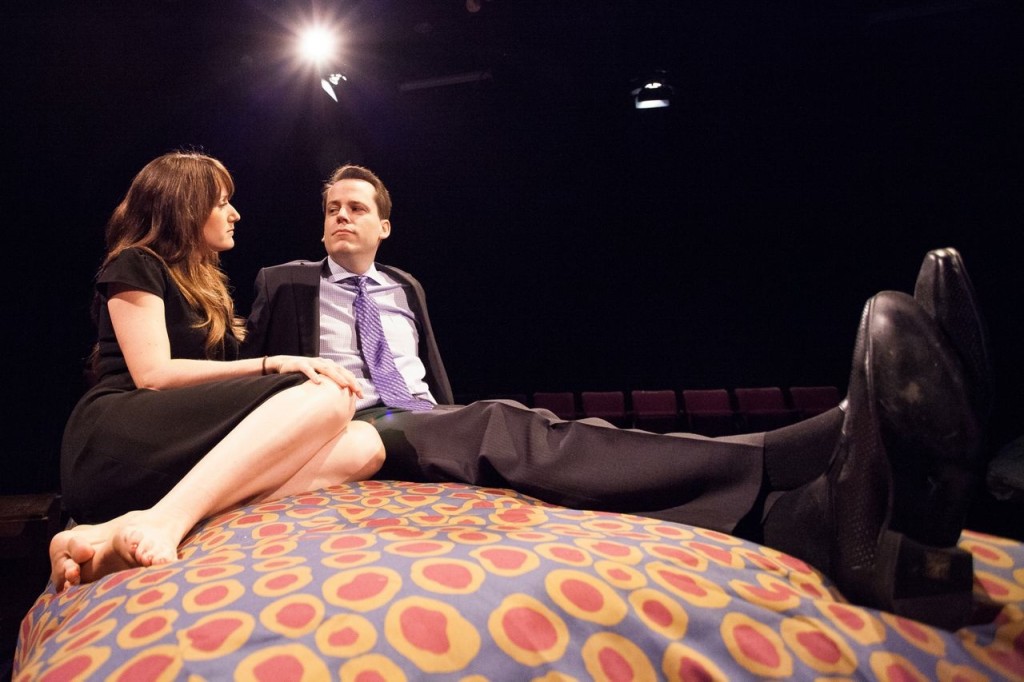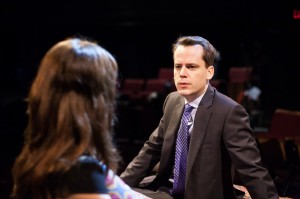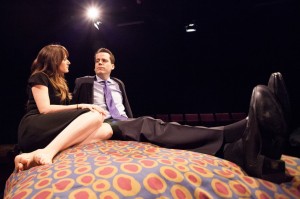
Credit: Shimon Karmel
At Studio 16 until December 7
mitchandmurrayproductions.com
Posted November 26, 2013
Becky Shaw, presented by Mitch and Murray Productions, makes my family look downright functional by comparison, notwithstanding what is likely to be a lively debate between the vegans and carnivores as to whether it will be tofu or turkey on the Christmas dinner table.
In Gina Gionfriddo’s play, Max Garrett (Aaron Craven) and Suzanna Slater (Meghan Gardiner) are already bitching at each other when we first meet them. Her biological father – his adoptive father – has been dead, according to Suzanna, three months. She’s still moping around.
“I don’t like that weepy-weepy, wah-wah stuff”, snaps pragmatic Max, who tells her it’s actually been four months, that the man was a liar, an alcoholic and that he squandered a fortune, leaving them with next to nothing. Adopted as a kid by Suzanna’s father and growing up with her, Max has a relationship with Suzanna that feels like – but isn’t, actually – incest.

Credit: Shimon Karmel
In the next scene Suzanna, whom we now see is quite neurotic, has been married to seemingly good-hearted, well-grounded, would-be writer Andrew (Charlie Gallant) for a few months. Max is still on the scene, still single. Andrew and Suzanna have set up a date for Max with Becky Shaw (Moya O’Connell), a down-on-her-luck office temp and co-worker of Andrew. The date is a disaster.
The play is very loosely based on William Thackery’s Vanity Fair; in that novel Becky Shaw is a conniving social climber who will do just about anything to gain a foothold in the upper class. In Gionfriddo’s play Becky is a badly damaged, emotional wreck who attempts to get her claws into rich, successful Max. She has a thing for black lovers who eventually dump her.
We don’t like anyone in Becky Shaw but in every case our feelings change in the course of the play. What we first see, we don’t eventually get. The best we can say about them is that we, at times, have a grudging admiration for them – especially Suzanna’s astringent mother Susan (Marilyn Norry) whose knack for calling a spade a spade is unequalled. The old dame sees everything: she recognizes, for example, that Suzanna has agreed to facilitating Max and Becky’s date knowing full well it will fail. And Susan probably also sees that Andrew hopes the date will disrupt Max’s too-close relationship with Suzanna. Norry, walking stiffly with a cane and firing off nasty but right-on comments, is wonderful in the role of the matriarch.
Indeed, under David Mackay’s direction, the best part of Becky Shaw is in performance. Gardiner, Craven, Gallant and O’Connell all take their characters through changing psychological stages: Gardiner from flippant to fearful; Craven from arch to aching; Gallant from altruistic to enabling; O’Connell from pathetic to predatory. The play doesn’t inspire sympathy for these characters that turn – like crazily spinning weather vanes in a gale – on spindles of moral ambiguity.

Credit: Shimon Karmel
But here’s a funny thing: reviews from all across the USA say that Becky Shaw is “ferociously funny”, “a romantic comedy of errors” and “amusing and craftily constructed comedy about ambition, the cost of being truthful, and the perils of a blind date.” This production of Becky Shaw did not strike me as funny at all nor did the audience the night I attended. Instead, I was reminded of David Mamet’s Oleanna in which I would have throttled the female character if I could. O’Connell’s Becky aroused the same desire in me; the character’s passive aggression struck in me a deadly combination of fear and anger. The overt nastiness of Max is nothing compared to the predacious clutches of Becky Shaw. At least he’s honest – or as honest as he allows himself to be.
Mackay sets the production in the round on David Roberts sleek and very functional set: two elevated stages – one empty, one with a bed – and a third performance area that functions as Suzanne and Andrew’s living room. It’s a very attractive staging that creates an immediate intimacy with the audience.
Becky Shaw is not what I would call a comedy but Gionfriddo makes honest observations about human nature: we are complicated creatures. Sometimes when we look good, we’re being very, very bad. Our psychological compasses swing madly and the best we can do in our relationships is to hope we’re reading the signs correctly.

